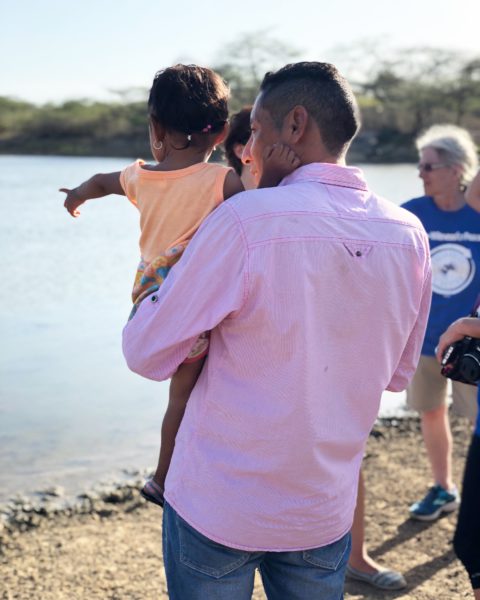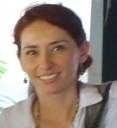Wednesday 17 October, Beyond BHP: protesting the world’s biggest mining giant 10am to 11am outside the Queen Elizabeth II Conference Centre, Westminster, London SW1: demonstration against BHP as it prepares for its AGM inside the building
Wednesday 17 October, 6pm to 9pm, Beyond BHP: protecting lives from the world’s biggest mining giant 6pm-9pm at UCL Institute of Education, London: Public event with speakers from Brazil, Chile, Colombia and the USA and creative contributions from Threepenny Festival Arts Association
Join us 13-20 October for eight days of art, discussion and protest with leading environmental human rights defenders visiting London from Latin America to share their experiences resisting the world’s largest mining company, which has been devastating communities with impunity for decades. For more information about our Colombian visitors and what they need see below:
COLOMBIA
Misael Socarras Ipuana is from the indigenous Wayuu community. He lives in north Colombia, La Guajira, in the community of La Gran Parada. He is a human rights defender, indigenous communicator, director, cultural expert and community leader.
 Misael says: “I am 48 years old, married according to the traditions of my people to Moncia Lopez Pushaina. I have six children, for whom I struggle daily to give them a better future, free of contamination and mining. [We want] to be autonomous in our territories, free and able to enjoy Mother Nature without restrictions or fear.
Misael says: “I am 48 years old, married according to the traditions of my people to Moncia Lopez Pushaina. I have six children, for whom I struggle daily to give them a better future, free of contamination and mining. [We want] to be autonomous in our territories, free and able to enjoy Mother Nature without restrictions or fear.
I have dedicated myself to defending the territory and water, which belong to us and not to the multinationals.
I am participating in this tour to make known to the world the abuses of which we are victims daily because of the multinationals, and to seek friends who can help us in this struggle against the destruction of our territory, dreams, and culture, which is the worst that could happen to a people.”
Rosa María Mateus Parra, lawyer in defense of human rights, territory and the environment, is a member of the José Alvear Restrepo Lawyers Collective (CAJAR), an organization that works for the enforcement of rights of indigenous, peasant and Afro-descendant communities. CAJAR aims to guarantee their survival and ability to remain in their territories while being able to exercise their social and environmental rights and strengthening their autonomy. This work is carried out through litigation, organizational capacity-building and advocacy.
 Rosa says: “We accompany the communities of La Guajira, because our paths crossed in life, we came to know the communities of La Guajira, and when you know a people and a place, you can come to love them. Now we love them and when you love something you defend it, that’s why we accompany the communities in their struggles and we defend them.
Rosa says: “We accompany the communities of La Guajira, because our paths crossed in life, we came to know the communities of La Guajira, and when you know a people and a place, you can come to love them. Now we love them and when you love something you defend it, that’s why we accompany the communities in their struggles and we defend them.
In order to understand what happens in La Guajira in the face of coal exploitation and its impacts, it would be necessary to open and recover the senses, to see, smell, hear and feel, but the power of lies in the midst of terrible damage clouds many minds and hearts. Our work is to be the voice of those who suffer, the coal of La Guajira comes to Europe smeared and laden with suffering, tears, illness, the loss of a culture that is thousands of years old, the coal comes smeared with the blood of innocent people.”
The BHP-affected communities of La Guajira demand:
We are participating in the advocacy tour in order to make a call for greater visibility and solidarity with the communities affected by the Cerrejón coal mine, these communities have been made invisible in their claims against the corporate power of Cerrejón.
1. We ask that the issues that affect thousands of people affected by the company are listened to attentively. The company tries to obscure a reality of contamination, the uprooting of indigenous ancestral territories, and the destruction of its social and cultural fabric, of diseases especially in children and girls, of the destruction of water resources – all of this under a slogan of corporate social responsibility.
2. We publicly denounce the systematic and widespread violation of human and environmental rights of communities, a company that acts as the largest socio-economic power in the region and a State with limited capacity and little willingness to enforce internationally recognised standards in human and environmental rights.
3. Considering the serious situation that exists in the territories and the recognition of the “Unconstitutional State of Affairs”, both by the Colombian Constitutional Court and the Inter-American Commission of Human Rights, it is necessary to call for the analysis and recognition of the externalization of costs of the open-cast coal mining activity of the transnational company Carbones del Cerrejón. If the costs assumed by the Colombian State in health, environmental, judicial, social and cultural liabilities, and from the economies of autonomous communities, who are now dependent on the company, were taken into account then the price of coal would be exorbitant and unpayable.
4. The company has captured, diverted, exploited and polluted the course of more than 18 rivers, streams and bodies of water, including the three most important in the region. Given the conditions of la Guajira, semi-arid and desert-like, these actions threaten cultural survival and food production, which is also linked to the severe starvation of Wayuu children, but to date there is no recognition of these impacts, nor to climate change, which also deserves attention and proposals by the company, especially in the second country most threatened by climate change.

